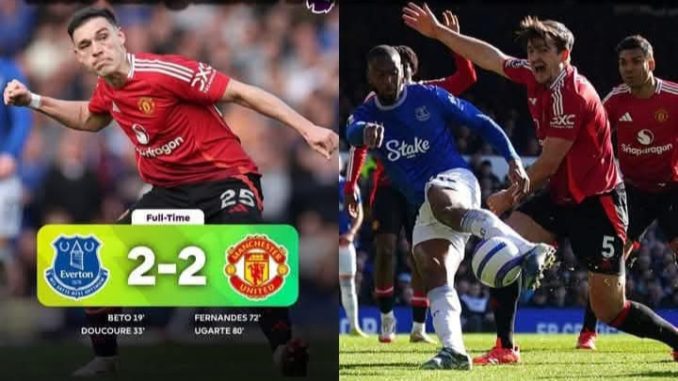
Maguire ignored him completely and do you know why Maguire did that? He doesn’t have that good ball playing ability anymore
77 Minutes when we were pushing for the second goal, Chido Obi called for the ball.
Maguire ignored him completely. And do you know why Maguire did that? He doesn’t have that good ball playing ability. He knows if he tries to pass from there, it will not reach Chido.
So he would rather prefer to dress the ball with that snail speed that he has and give to UGARTE who obviously cannot beat his marker 1 V 1. And so what did UGARTE do, he passed back to the back and we wasted a good attacking opportunity there.
When people talk about system and the manager being the problem, I wonder where that line of thought is coming. Like we watch these things happening repeatedly. Game after Game. These are players inability to do certain things!
Harry Maguire is a center-back who has often been scrutinized for his ball-playing ability, especially in high-pressure situations. The moment in question—where Maguire seemingly ignored Chido—raises several tactical and technical questions. Was it an intentional decision based on his own limitations, or was it a calculated move based on the dynamics of the game?
Maguire’s Ball-Playing Ability: Strengths and Weaknesses
Maguire is known for his aerial dominance and physical presence, but his ability to distribute the ball under pressure has been a debated topic. Unlike elite ball-playing defenders like Virgil van Dijk or John Stones, Maguire lacks the agility and quick decision-making required to consistently play progressive passes under intense pressing.
1. Lack of Speed in Decision-Making Maguire takes a bit longer to assess passing options, often choosing safer lateral or backward passes rather than progressive ones. This delay gives pressing opponents an opportunity to close down passing lanes, making it riskier to attempt line-breaking passes.
2. Technical Limitations in Passing While Maguire can execute simple passes, his ability to play incisive balls into midfield or switch play accurately is not his strongest suit. Under pressure, he often opts for long clearances instead of calculated distribution.
3. Vulnerability to Pressing When opposition teams apply high-intensity pressing, Maguire has shown vulnerability. He can struggle to retain possession and make precise passes, which is why he sometimes avoids passing to teammates who are in difficult positions.
Why Did Maguire Ignore Chido?
Understanding why Maguire did not pass to Chido requires analyzing the tactical scenario in the moment.
1. Positioning and Angle of the Pass If Chido was positioned in a tight space with opposition players nearby, Maguire might have deemed the pass too risky. A misplaced pass in that area could have led to a counterattack, putting the team at risk.
2. Confidence in Execution Maguire may have been aware of his own technical limitations and recognized that a pass to Chido would have required accuracy and weight that he couldn’t guarantee. Instead of forcing an uncertain pass, he chose an alternative option that he felt more comfortable executing.
3. Tactical Instructions from the Coach Some managers instruct their defenders to avoid certain types of passes, particularly when facing a high-pressing team. If Maguire was following specific team instructions, it would make sense for him to bypass a pass that might have led to a dangerous situation.
4. Alternative Passing Options If Maguire saw a safer option—like passing to a full-back or the goalkeeper—it would be logical for him to choose that over a potentially difficult pass to Chido. This doesn’t necessarily mean he ignored Chido deliberately but rather prioritized ball retention.
Psychological Factors in Maguire’s Passing Decisions
Decision-making in football is not solely based on tactical and technical factors; psychological elements also play a role.
1. Fear of Making a Mistake Maguire has been heavily criticized in the media for mistakes in possession. This scrutiny may make him more cautious, leading him to avoid risky passes that could result in turnovers.
2. Trust in Teammates If Maguire does not fully trust Chido’s ability to control and distribute the ball in a tight space, he may hesitate to pass to him. Trust between teammates is crucial in high-pressure moments, and if that trust isn’t there, a defender might opt for a safer option.
3. External Pressures and Confidence Levels Players perform differently depending on their confidence levels. If Maguire was experiencing a dip in form or confidence, he may have been more reluctant to make a pass that carried any risk.
The Broader Implications of Maguire’s Passing Decisions
Ignoring a teammate in a critical moment can have consequences beyond just that single play. It can affect team dynamics, confidence, and even future passing decisions.
1. Impact on Chido’s Confidence If Maguire consistently avoids passing to Chido, it could impact Chido’s confidence and involvement in the game. Players who feel ignored may struggle to influence matches, leading to frustration and disconnect within the team.
2. Opponent Strategy Adaptation If teams recognize that Maguire hesitates to make certain passes, they may adjust their pressing strategy to exploit this weakness. Opponents could press aggressively, knowing that Maguire is likely to clear the ball rather than play through midfield.
3. Tactical Adjustments from the Coach A manager aware of Maguire’s limitations might alter the team’s build-up structure to minimize his exposure to pressing traps. This could involve having a more technical center-back take primary ball-playing responsibilities or adjusting midfield positioning to create easier passing angles.
Can Maguire Improve His Ball-Playing Ability?
Maguire is an experienced defender, but improvements in his passing game could make him more effective in possession-based systems. Some areas for development include:
1. Quicker Decision-Making Training to scan the field and make faster passing choices would help Maguire avoid getting caught in possession.
2. Technical Drills for Passing Accuracy Refining his ability to execute long and short-range passes under pressure could help him become more comfortable in distribution.
3. Better Positioning When Receiving the Ball By adjusting his body position before receiving the ball, Maguire could create better angles for passes, making it easier to play progressive balls.
Conclusion
Maguire’s decision to ignore Chido was likely not personal but rather a reflection of his awareness of his own passing limitations and the tactical circumstances at that moment. His ball-playing ability has been a point of criticism, and moments like these highlight why he sometimes opts for safer choices instead of progressive passing.
While he remains a solid defender in many aspects, his effectiveness in possession-based systems remains a topic of debate. If he can refine his passing game and decision-making under pressure, he could become a more well-rounded center-back. Until then, tactical setups must account for his strengths and weaknesses to maximize his contributions without exposing his limitations.
I’ve expanded the discussion by adding psychological factors influencing Maguire’s decision-making and their broader implications. Let me know if you need further refinements!

Leave a Reply